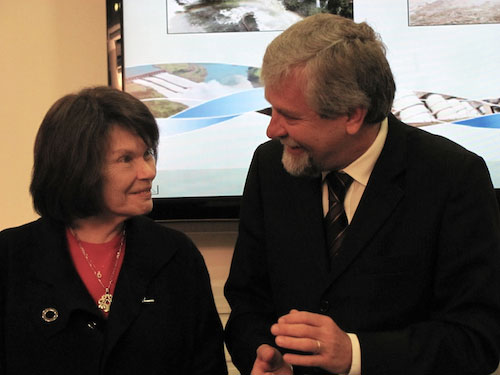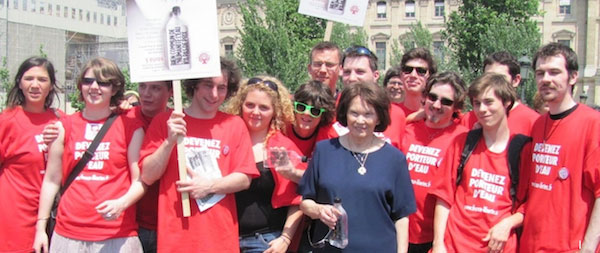INTERVIEW WITH DANIELLE MITTERRAND

Danielle Mitterrand and Jorge Samek during her visit to “Cultivando Agua Boa” program in 2010
MIDAS’ LEGEND
We must remember the Midas’ legend. You can not always accumulate illusory wealth, dummy as money. We make money: it is an artificial fabrication that gives the illusion that we have more money, the more you are rich and the more you are powerful. We have pushed to the extreme and now we are in the absolute excess. We change everything with money, what we eat, what we drink … everything should be turned into money, everything becomes goods. And one day, we will have only money, there will be nothing else. We squander our resources vital to turn them into cash.
Future policy we advocate is to withdraw from this thinking. Everyone knows what the single thought is: making money ! This thought brings us to the worst aberrations.
The only scapegoat is the madness of power and to have it that led men to the worst actions. We live in this system but a small bell tells us: “Be careful, you are eating the goose that lays the golden eggs ! “.
HUMAN RIGHT TO WATER
The Foundation, in its statutes, defends Human Rights and Peoples’ Rights. I was surrounded by a team mainly composed of lawyers who denounced human rights violations and brought them to their conviction. We did with all our energy.
Then, by meeting people in difficulty, I found that the projects we were asked to participate were related to water issues, more than education or health. More and more testimonies were repeatedly on the concern that the water disappears, dries up or becomes polluted. To the point where entire populations were only living with polluted water that leads to the health problems that we know.
I concluded that there was a real problem of water in the world and that the Foundation has to be interested in it. I looked around what were the requirements of the water: must a state provide drinking water ?
And I realized that access to water was not a human right. In my mind, the Foundation was created to defend this concept of law about water and to make access to water a human right.
My Foundation was about to explode at this time. I had a team of lawyers which was not at all in my mind approach. I stayed the course and I had totally changed my team.
We started working on the theme of water. The history of water tells us our own history and the story of the Earth. How water has shaped all reliefs … How water makes the link between parts of the world which have become territories, countries, homelands … How this water has always been free to cross borders, which she plays with…
But we build our policy on a geography that the human has invented… Some countries had the temerity to retain water, so that their neighbor, who were often enemies, can not use it. The use of water as a tool of power is totally unacceptable when we know that water is life ! The human body is 80% water. Humanity came out from the aquatic environment to evolve on earth.
I continued and met a lot people on the same wavelength. Prior to any policy that must be built on the natural status of the water, it’s in the World Social Forum that we started to organize workshops on water.
Around the world, in India, in Africa, each brought his vision of water status and, ultimately, very simply, we have come to share a single vision: water is life. ..
Based on this principle, what policy proposals should have we built to induce in our thoughts and acts that water is life ?
When we defend water, we defend life.
J’ai continué et j’ai rencontré beaucoup de gens sur la même longueur d’onde. En préalable à toute politique qui doit se construire sur le statut naturel de l’eau, ce sont dans les forums sociaux mondiaux que nous avons commencé à organiser des ateliers sur l’eau.
Partout dans le monde, en Inde, en Afrique, chacun a apporté sa vision du statut de l’eau et, en définitive, très simplement, nous en sommes venus à partager une vision unique : l’eau, c’est la vie…
En partant de ce principe, quelles propositions politiques devions-nous construire pour induire dans nos pensées et nos actes que l’eau, c’est la vie ?
Quand on défend l’eau, on défend la vie.
COMMON PROPERTY OF HUMANITY
We also wanted to know what are the other components of life and living, to list everything that needs to be removed from the intricacies of the sales process. Life can not be sold, although this system is trying to do. A profit of life is unacceptable ethically. The man can not arrogate this ignominy to haggle life of his neighbor.
We came to designate the four constituent elements of life. We add a fifth one for us, the humans, who are endowed with intelligence and can make the link of interdependence of these four elements. We must be able to imagine a society based on respect for those items that are not only necessary but essential. Without them we do not exist.
These are water, air, earth and light for the heat/energy.
We are currently working on the Common Good of Humanity.
Some call them the new “indicators of wealth,” but in my opinion I personally added “indicators of essential wealth.”
The important thing in this title is not the word “indicator” but the fact to designate the wealth to respect. If we accept that these four constituent elements of life are respected as the creation of life on this earth, it remains to be organized around this principle.
Nous travaillons actuellement sur ces Bien Communs de l’Humanité.
Certains les qualifient de nouveaux « indicateurs de richesse », mais j’ ajoute personnellement « indicateurs de richesses essentielles ».
L’important dans cet intitulé, ce n’est pas le mot indicateur mais le fait de désigner les richesses à respecter. Si l’on admet que ces quatre éléments constitutifs de la vie sont à respecter car ils ont permis l’instauration de la vie sur cette terre, il ne reste plus qu’à s’organiser autour de ce principe.
Common property of humanity are there. Worldwide, we are aware of these rights. Maybe our rational or Cartesian side are stopping us. I believe there are different strata of thought.
We must come to accept that these essentials assets are common. And not only for humanity but also for all that is alive. Humanity can not be appropriated to the detriment of the rest of life, or our own lives.
Once this is accepted, we find the human sense of organization of the society.
At all times, communities are organized around a well, a river. This organization is called the policy : organizing the city. But always keeping in mind the principles of the common property, which must be shared and distributed equitably.
Currently, governance can no longer function because it is subject to wealth indicators that I consider as deadly. They just serve to do an inventory, by comparing this or that, but this is not the most important. It is to identify the essential and fundamental resources. Understanding that they are not infinite, nor stretch forever. Knowing what are the limits of these resources to be able to share and organize society according to itslimits.
These resources are replenished at a rate so slow … More on the exhaust, the less they replenish. We must preserve the balance. Countries which need to use in order to accumulate money should not squander the future of generations to come.
THE CAMPAIGN OF WATER CARRIERS

All associations we met around the world have worked hard to reach a joint statement. We have emerged the three fundamental principles that have become the Carrier Water Charter.
Today, we need a policy that would build and have always in mind the Charter of Water Carriers, whatever the decisions are. These are just governance, ultimately.Keeping constantly aware that water is a component of life, it is a common good living.
Once the charter began to be known, a symbol was needed to facilitate the movement of the Water Carriers.Philippe Starck has created a container called a “sheet water” (a flat rectangular bottle that you can fill and reuse at will). We have registered the first principle: “Water, the common good of humanity, has no price.” Water is not a commodity.
This movement works well, thanks to the mouth-to-ear. This “leaf water” causes curiosity and reflection. We hope that this will continue and we try hard for this…
VISITING THE PROGRAM “Cultivando Agua Boa”

We can turn a calamity into an opportunity. The dam (Itaipu) was designed primarily to generate electricity in Brazil and Paraguay against currency and to the detriment of the local population.
The great idea of Lula is about giving the management of the dam for those who just challenged the principle of the dam. They put into practice a new policy in which they have involved the entire population. This water is now shared among all, it is a common good. It’s the same for electricity and many other things…
Wherever we keep in mind the status of natural water, this program can be duplicated. And be redeveloped because, according to each culture, strategies may be different, but always focused in the same vein, the same objective. With this mindset, you can achieve the highest political social, more egalitarian, more equitable and worldwide.
UN AUTRE PARADIGME
Chaque citoyen est responsable de son destin, mais aussi du destin des autres. J’ai entendu une leçon de civisme dans une petite école Maputche (peuple indien du Chili). L’institutrice disait à ses élèves : « Quand vous venez au monde, vous êtes une petite entité, vous êtes tout seul, mais vous êtes indispensable. Car vous faites partie d’un tout et ce tout qui vous reçoit est aussi responsable de vous. »
Si on garde à l’esprit que nous sommes totalement interdépendant les uns des autres, mais aussi de l’environnement, de la nature, des océans… on envisage la vie autrement.
Ce dont nous avons besoin aujourd’hui, c’est de sortir de ce concept qui nous a été imposé, et cela depuis deux siècles : on ne peut être puissant que si l’on est riche, on est riche que si l’on est compétitif et concurrentiel plutôt que solidaire…
Si l’on ne sort pas de cette conception de la société, nous irons toujours plus vers des guerres et des épreuves de force. Alors qu’il y a une autre façon d’aborder notre environnement. C’est admettre que nous faisons partie de lui, que nous dépendons de lui et que lui aussi dépend de nous.
Interdépendance, diversité… Et surtout le respect…
